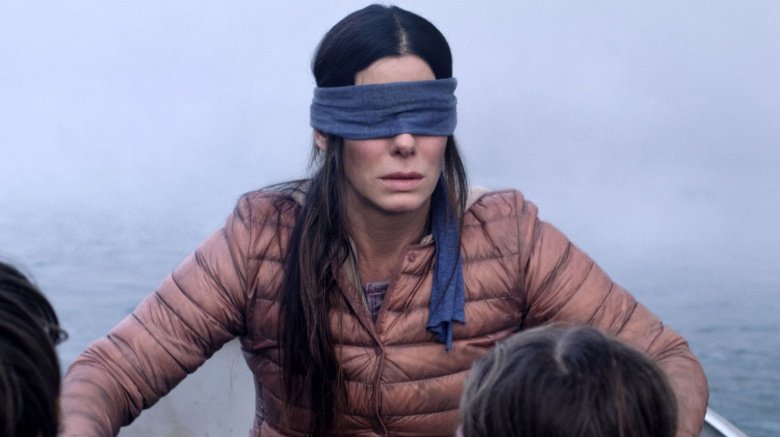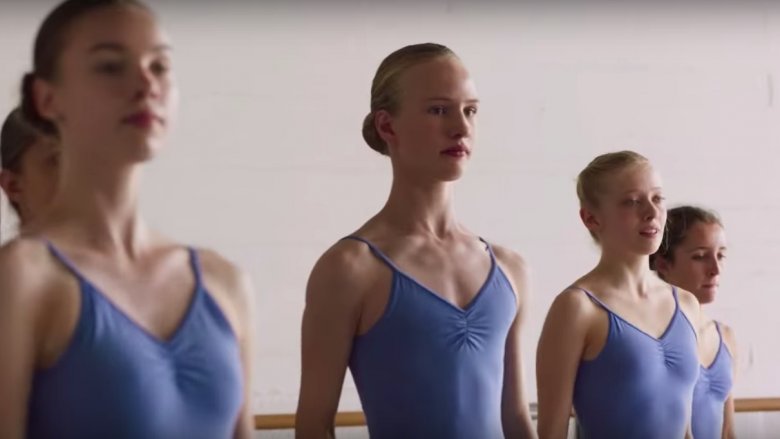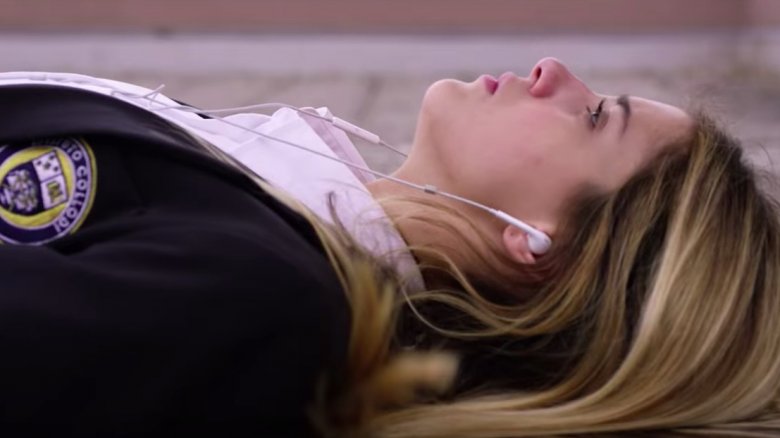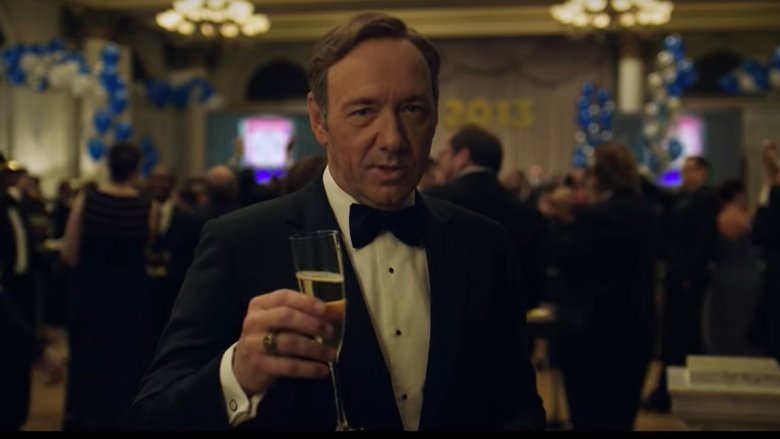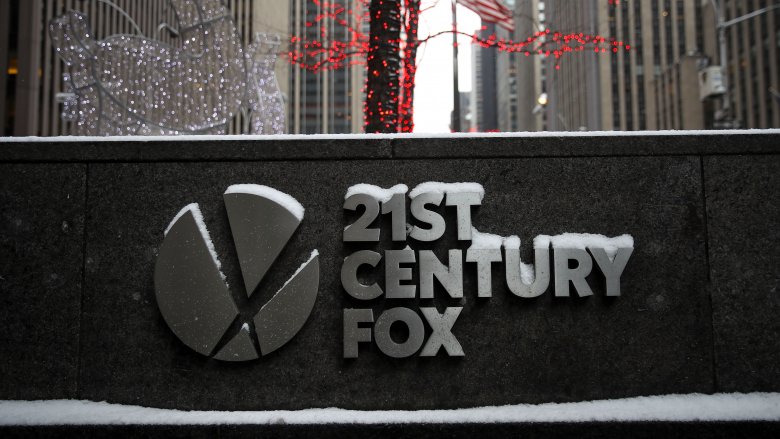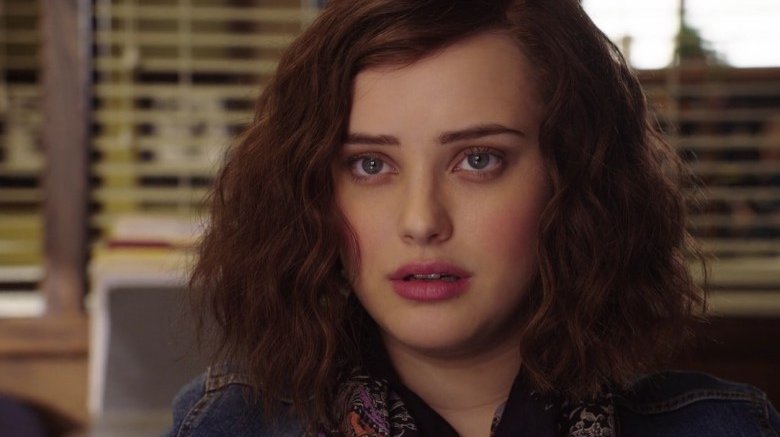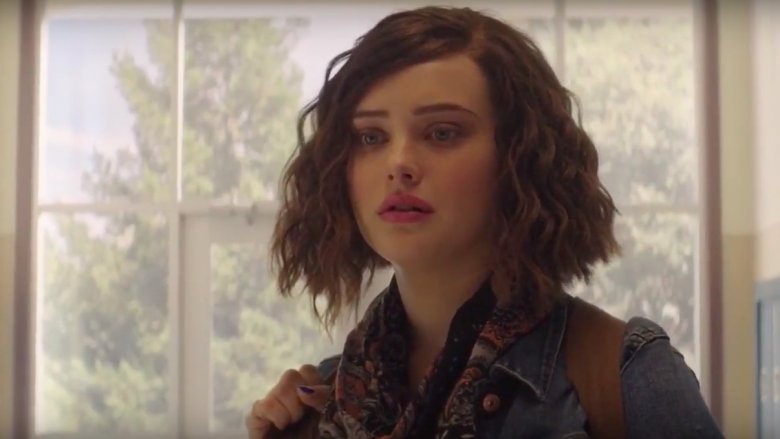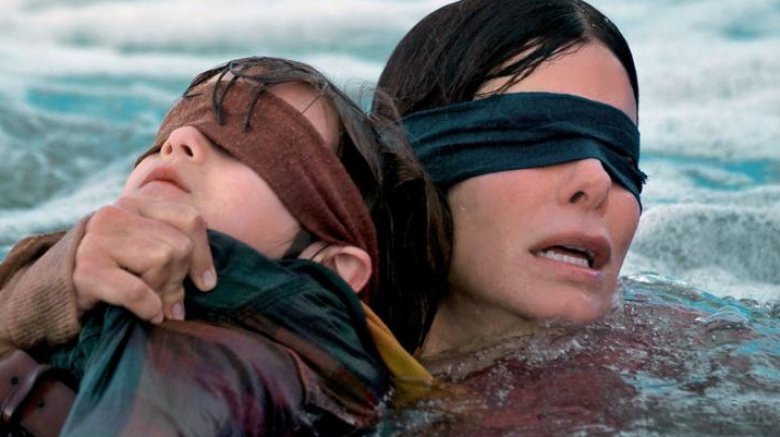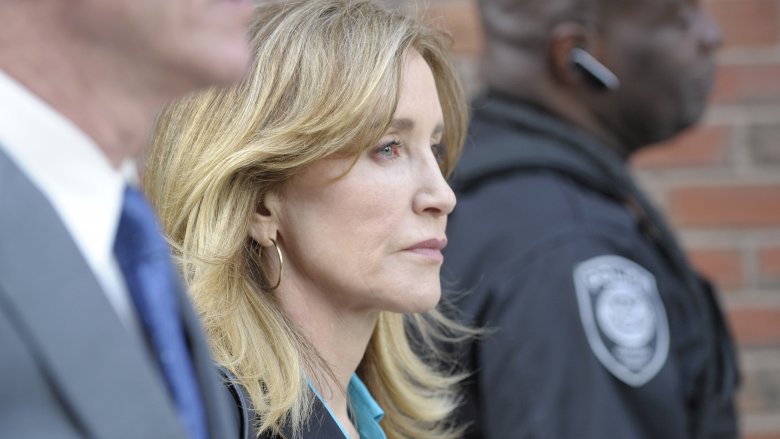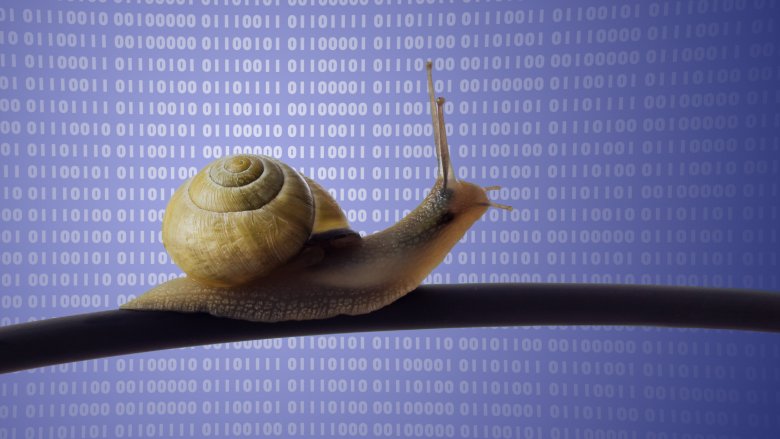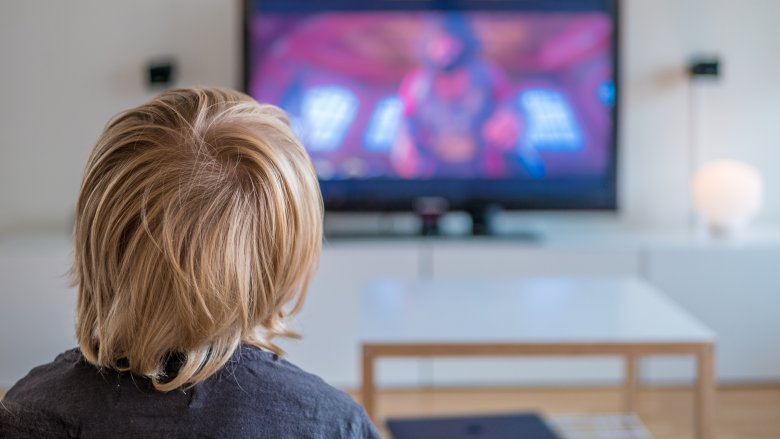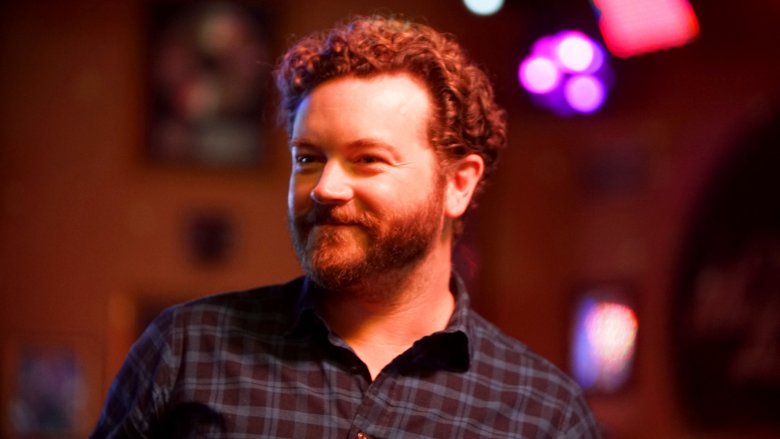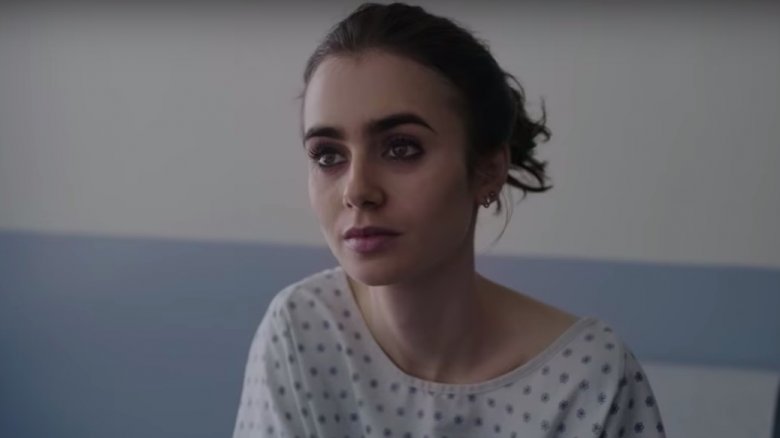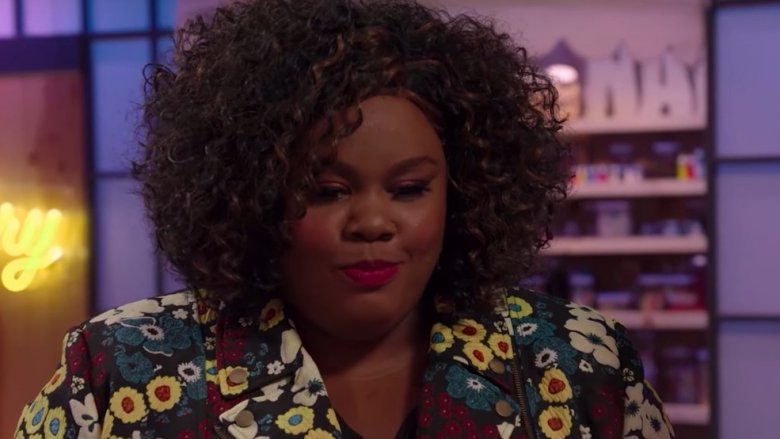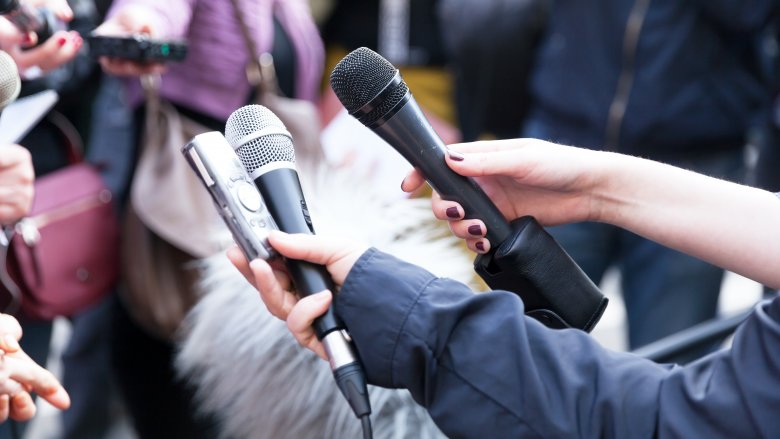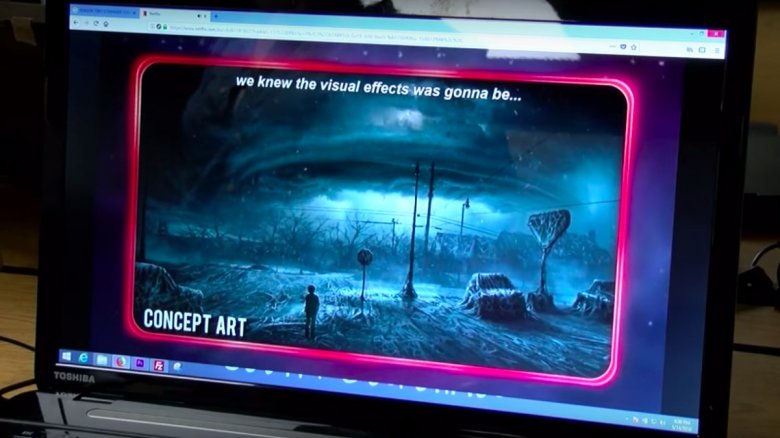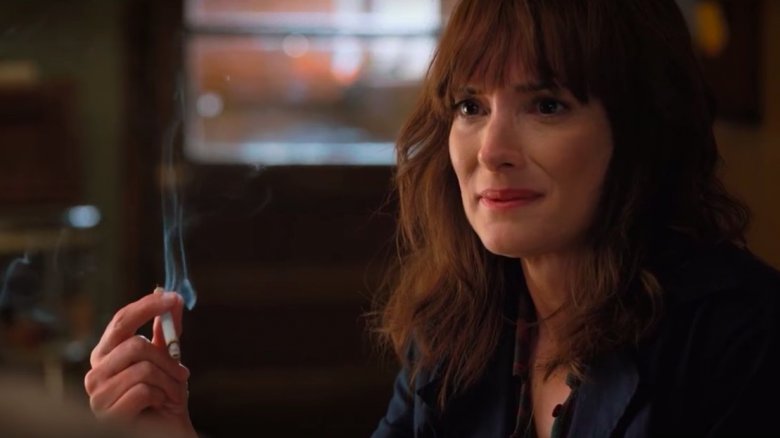The Biggest Scandals To Ever Hit Netflix
Once upon a time, Netflix was that dumb concept you rolled your eyes at: DVD rental by mail because it was too hard to go down to Blockbuster when you wanted to rent a movie or something. Today, Blockbuster is a old-timey joke for adults to chuckle at in Captain Marvel, and Netflix is an entertainment giant with its own movie and television originals. But all giant companies eventually have scandals because they're giant and because scandals are super-fun.
Like just about everyone else in the business, Netflix has had to waste a lot of its valuable time defending itself against accusations, both baseless and not-baseless, sometimes as a result of its own strange decisions and sometimes because its stars and other employees have done questionable things. And so, since scandals are super-fun and let's face it, you love them just as much as every other human, here are some of the biggest headline-making scandals that Netflix has ever been hit with.
You could have told this story without all that
There are some things you just don't do on television, whether it's pay TV or network. You don't cross the line between close-to-being-obscenity and obscenity, for example. You don't incite violence or promote racism. And you don't show the naked bodies of underage humans.
Netflix's Girl is a Golden Globe nominee, but critics say it crosses a couple of big lines. The film follows a transgender girl named Lara who's struggling to succeed as a ballerina. She's bullied at school and is obsessed about her body to the point where she ends up with a terrible infection because she has taped down her genitals for rehearsals. We won't give away the ending except to say that it's awful and tragic, and if you've got a weak stomach or a heightened sense of empathy, you'll either want to prepare yourself or maybe just give Girl a complete pass. Some trans critics also felt that the show — which did not involve trans writers, directors, or actors — sent the wrong message to young people in particular.
Perhaps the scene that raised the most eyebrows was the one with a full-frontal shot of the 15-year-old actor who portrays Lara. Netflix's own censors thought the scene was too much, and these are the people who gave all of Orange Is the New Black a pass. According to Decider, the Netflix version of the film was supposed to air sans-questionable-scene, but the film's director complained and it was left in. But was that really a victory for art, or was it unnecessarily gratuitous? We know this much: It's an uncomfortable scene either way.
No, trafficking is not edgy
So we know that awful things happen to kids in this world. We also know that in order for everyone to be healthily aware of how vulnerable children are, we need to have some sort of representation of those awful things in the media, whether it's investigative reports or documentaries or, when very sensitively done, fictionalized stories. But there are lines, Netflix. There are lines.
According to Refinery29, the 2018 series Baby was inspired by the true story of 14- and 15-year-old girls who sold themselves so they could afford to buy designer clothes. The official bio talks about "forbidden love, family pressures, and shared secrets." Um, what? Okay, so maybe the premise is based on something that did actually happen, but making it into an edgy television series seems a little less than okay. In fact the National Center on Sexual Exploitation (NCOSE) pretty much thought the same thing — it asked Netflix to nix the series before its premiere because the show basically glamorizes a terrible thing.
As for the show's handling of those issues, Decider says it's kind of an even divide between portraying prostitution as "dark and sad" and also not really condemning it. And despite the backlash, Netflix didn't really seem to seriously consider pulling the series. As of 2019, Baby is still listed among its offerings.
When Kevin Spacey ended up being worse than Frank Underwood
Oh Kevin Spacey, you were so delightfully nasty as House of Cards' Frank Underwood, and we did so love watching you spearhead the fictionalized implosion of Washington politics because it was such a lovely distraction from the real, actual implosion of Washington politics. And then we found out you were gross and nasty in real life, and now we don't care about Frank Underwood anymore.
In case you weren't paying attention, Kevin Spacey was fired by Netflix because of a sexual misconduct scandal, which ended up costing the service close to $39 million. According to Reuters, the figure was related to "unreleased content [Netflix] decided not to move forward with." And it decided not to move forward with the content because the number of people accusing Kevin Spacey of sexual misconduct was high, like cracking into double digits and then some — as of early 2018, Spacey had more than 30 accusers, including eight who worked for House of Cards. And they were accusations of especially toxic behavior, too, including stuff like making aggressive advances on minors and putting his hands down the pants of a production assistant.
In this case, Netflix certainly did the right thing by letting Spacey go, regardless of how much it ended up costing them. We were never going to look at that dude the same way again anyway.
Help Netflix save us from having to work at Fox
It's not really clear why Netflix wanted to hire Fox employees specifically, but perhaps they were clawing at the windows and peering through the glass with "save me" eyes and Netflix felt bad for them? Whatever the reason, the Hollywood Reporter says Netflix was poaching Fox employees and Fox was super not-happy about it. In a lawsuit, Fox called it a "brazen campaign to unlawfully target, recruit, and poach valuable Fox executives by illegally inducing them to break their employment contracts with Fox to work at Netflix." Fox claimed Netflix tried to recruit two higher-level employees — a programming executive and a marketing executive — despite knowing they had contracts with Fox.
The lawsuit is still pending as of May 2019, but Viacom has also come forward with a poaching accusation against Netflix. In late 2018, it claimed Netflix had also rescued — err, stolen — one of its contracted employees.
Netflix isn't taking this all lying down, though — it says Fox basically bullied its employees into taking unfair deals that are against public policy, which sort of gave it the right to step in and say, "Hey, come work for us instead." Fox, on the other hand, says Netflix had "an actual poaching blueprint" which listed the names of executives and the time remaining on their contracts.
13 reasons why you shouldn't watch this show
Numbers 1 through 13: because 13 Reasons Why glorifies teen suicide.
When 13 Reasons Why debuted in 2017, it was almost immediately criticized because it's not just the story of family and friends having to deal with the consequences of a loved one's suicide. It's also (or so the critics say) kind of a romanticized depiction of suicide.
The story begins with the suicide of Hannah Baker, who has left a set of recordings behind to let everyone in her life know why she did what she did. And while adults with happy and stable lives may be able to watch a series like this from a detached perspective, this is probably not good viewing material for younger people who are having social challenges and may be contemplating suicide. According to Rolling Stone, 13 Reasons Why makes suicide seem like the easy way out, and because Hannah Baker continues to exist in flashbacks, it kind of makes suicide seem less final, too.
Now, yes it's obvious to most of us that suicide is definitely, very final and it seems like anyone with a rudimentary understanding of death would know that, but kids who are contemplating suicide aren't exactly in a rational frame of mind. So really, there are much better viewing choices for teenagers, even the ones who are happy and well-adjusted.
If you or anyone you know is having suicidal thoughts, please call the National Suicide Prevention Lifeline at 1-800-273-TALK (8255).
13 reasons why you need to just cancel this show, already
As it turns out, all those fears about the triggering potential of 13 Reasons Why have turned out to look mostly correct. According to NPR, a study found that there was a 28.9% increase in the suicide rate in American children aged 10 to 17 in the month following the show's debut. The study found a correlation but not a direct causal link. However, that increase is huge — it's a much greater increase than anything seen in any other month over the five-year period studied by the researchers.
There are some specific suicides that can be directly linked to the Netflix original — 19-year-old Emily Bragg committed suicide a few weeks after watching the series and mimicked the suicide of Hannah, the show's central character. Bragg was being treated for bipolar disorder and other mental-health issues at the time of her death. "I truly believe that that [show] was the final thing that kind of just pushed her over the edge," said her mother. Netflix, it's probably time to just cut your losses and take the show off your service already.
If you or anyone you know is having suicidal thoughts, please call the National Suicide Prevention Lifeline at 1-800-273-TALK (8255).
Bird Box contained footage from a real-life disaster
Dear Netflix, it's a bad idea to use real disaster footage in your fictional movies and television shows. Yes, Netflix actually did this, and it was understandably distressing for a lot of people.
Now if you were a heartless person you could make a very heartless argument for why Netflix should be allowed to use disaster footage — it does save them quite a lot of time and money they'd otherwise have to spend either recreating a disaster on-set or with CGI. On the other hand, anyone who has lost loved ones in a disaster shouldn't have to be surprised when footage of their loved one's final moments shows up in a popular Netflix film. And we're not talking about some old footage from long-ago disasters where all surviving family members are likely dead, either, we're talking about the 2013 Lac-Megantic rail disaster in Quebec, which claimed 47 lives.
According to the BBC, Netflix used a clip from the disaster to illustrate the early, apocalyptic scenes in the film Bird Box. Granted, the clip came from a stock footage company, so maybe Netflix wasn't entirely aware of its origins? But it's not like they were especially quick to remove it or anything — in fact early complaints were met with the corporate version of a shrug, and it was only after Canadian officials sent Netflix an open letter that the service decided they'd better replace it, because you don't cross those Canadians, right?
Hey, Felicity Huffman, did you also pay Netflix to put you in that movie?
The college admissions scandal of 2019 was a profound example of just how much division there is between the haves and the have-nots of the world. Thanks to Lori Loughlin and Felicity Huffman and loads of other super-rich people, we are all very much aware that all you need to get into a respected university is money.
When Huffman's name came up as one of roughly 50 individuals who bought their kids' way into prestigious universities, most of the college-educated population lost their collective minds. And when that happened, Netflix went, "Oh, everyone appears to be losing their collective minds, maybe we'd better not release that Felicity Huffman movie in case the world starts hating on us."
According to Business Insider, Huffman appeared in a film called Otherhood, which was supposed to be released just a couple of weeks after Huffman pleaded guilty to charges related to the scandal. But as of May 2019 it still wasn't listed among Netflix's offerings. Netflix gave the punt to Lori Loughlin, too, who was also implicated in the college entrance scandal and was a four-season "guest star" on the series Fuller House. A production source told TMZ that "there are currently no plans for her to return to the fifth season," which is really just a polite way of saying, "We'd like to stay really far away from even the edges of this particular scandal."
They throttled you but it was for your own good
Netflix will still send you DVDs by mail if you really want them to and it's not as big a deal anymore, but back when that was Netflix's main gig, they were accused of "throttling" people who were too comfortable with their unlimited accounts. In those days, if you had the "three DVDs a week" plan but you returned your movies too quickly, you got flagged as a heavy user. In order to keep those heavy user accounts profitable for the service, Netflix would delay shipments so those customers weren't receiving as many titles. In other words, "unlimited" didn't really mean "unlimited," much like "unlimited" internet can often mean "unlimited until you reach a certain point and then unusably slow for the next three and a half weeks but hey, at least it's still unlimited access to an unusably slow service, right?"
Anyway, Netflix has also been accused of a different kind of throttling on its streaming side. According to the Competitive Enterprise Institute, Netflix has been throttling certain customers for years — notably those who are using the AT&T or Verizon wireless networks. But why? The company says it caps video streams on AT&T and Verizon at 600 kb per second but has no such limitations for people using Sprint or T-Mobile because those services don't charge fees to customers that go over their data allowances. On the company's blog, Netflix said it "believe[s] restrictive data caps are bad for consumers and the Internet in general," so in other words, it's for your own good. You're welcome.
And now for a word from our sponsors
Netflix hardly ever has any decent movies, and if you don't live in a city you're forever having to wait for the stupid app to buffer. But most of us love Netflix anyway because it produces some danged fine commercial-free television and it doesn't feel like it costs that much money to subscribe.
But what if they took the whole "commercial-free" thing out of the equation? Imagine not only having to sit through buffering but also having to sit through buffering commercials. (It's a special kind of hell known as Hulu.) So in 2015 when people heard Netflix was going to add commercials to its content, everyone grabbed their torches and pitchforks and marched on Netflix headquarters. Not really, but you'd think.
According to the Motley Fool, the rumor took root when Netflix began running trailers at the end of shows and movies, so after you finished streaming something you'd see a trailer for a Netflix original series. Evidently, there were lots of people who thought this was gateway advertising, and Netflix was just preparing everyone for what would be an eventual onslaught of Snuggle Fabric Softener commercials.
Netflix had to release a statement to reassure customers that it wasn't going to happen. "No advertising coming onto Netflix," said CEO Reed Hastings on a Facebook post. "Period. Just adding relevant cool trailers for other Netflix content you are likely to love." So relax, people. Your commercial-free life is safe for now.
Just kidding about that whole grandfathering thing
"Grandfathering" once meant sitting in a way-too-warm living room that smells like Bengay and mothballs and telling your grandkids the same story about the old days that you've already told like 25 times, but you don't care because you're old and you've earned the right to be redundant. Grandfathering, of course, is not to be confused with being "grandfathered," which basically means being on the receiving end of all that.
Today, being grandfathered in at Netflix usually refers to an old account that maintains its original perks while all the rest of the world's suckers who didn't jump on the bandwagon ten years ago now have to pay more money for less. According to Variety, in 2016, Netflix user George Keritsis filed a proposed class-action lawsuit against Netflix, accusing the company of raising the price on his grandfathered account. Keritsis said Netflix promised his account would be forever and ever until the end of all time $7.99 a month and it was, right up until the point where it was $9.99 a month.
The progress of the lawsuit is unclear. The story dropped out of the news almost as quickly as it arrived, and there doesn't seem to have been a whisper, a long-winded story, or a "get off my lawn" heard about it since.
Wait, this is supposed to be sensitive?
All entertainment companies have to find the balance between reality and sensationalism. They don't do this because they dislike reality; they do it because they're pragmatic. Reality is boring. Just ask anyone who lives in reality. No one wants to watch a show about how you get up in the morning and eat an egg sandwich and sit in front of your computer all day. Because reality is boring.
So a certain amount of embellishment has to happen with just about every television show. Sometimes that's okay! Sometimes it's offensive and insulting and the people who make the shows don't seem to know the difference.
One example of this happening is with Netflix's sitcom Atypical, which Quartz says is supposed to be "a sensitive look at the problems autistic people face in the dating scene." But it's a sitcom, so ... how sensitive can it be, really? Anyway, critics say this show just paints autistic men as stereotypically nerdy and frankly kind of sexist. Because the protagonist of Atypical is autistic, he has trouble understanding social cues, which means he's constantly misinterpreting the signals coming from everyone, and especially from the opposite sex. And because he's autistic, we're supposed to excuse the awful things he does as a result of those misinterpretations, you know, like physical abuse and breaking and entering. But hey, it's a sitcom, right? All's fair in love and putting female characters in uncomfortable, misogynistic situations for a laugh.
Hey random soccer mom, let me tell you about my company's legal problems
Even non-executives know that you should never discuss ongoing legal issues with random people you meet at soccer games. Right? But executives especially know these things because you don't get hired for an executive position if you are dumb.
We're not saying this guy is dumb or anything, but c'mon. When Danny Masterson of the Netflix show The Ranch was accused of rape and then fired in December 2017, the guy who ran Netflix's global kids content was also fired because he did a really stupid thing. Also, he was kind of a jerk, but it's unclear if that actually factored into the decision to fire him.
According to Paste, Andy Yeatman was attending a kids' soccer game in Los Angeles (this was before Masterson's firing) when he struck up a conversation with another spectator. When the spectator found out he worked for Netflix, she asked him why they still hadn't done anything about the Masterson problem. His reply: "We don't believe" Masterson's accusers. Well oops, the woman who asked him the question actually was one of Masterson's accusers, so that was embarrassing for him. Worse than embarrassing, actually, because Netflix ended up firing Masterson and Yeatman. So just in case you were thinking it was okay to discuss your company's legal issues with random people you meet at kids' soccer games, well, there you go.
Now do eating disorders, Netflix
And then, because Netflix never learns, they decided to greenlight a show that some critics say makes eating disorders seem glamorous. Because nothing says smart and sophisticated like bingeing and purging, right?
The trailer for the Netflix original movie To the Bone premiered in July 2019 and was immediately met with social media outrage. According to Decider, viewers accused Netflix of "romanticizing mental illness," and some of them called the trailer triggering and warned anyone suffering from an eating disorder to avoid the film.
Netflix star and general movie star Lily Collins, who struggled with anorexia in real life, defended the movie as an honest portrayal of eating disorders. "The two minute and thirty second trailer doesn't show the entire scope of the movie," Collins said. "Having experienced this subject matter and gone through the disorder, we would never seek out to make a movie that fetishizes or encourages or glamorizes the disorder in any way, shape or form." Still, if you're suffering from or recovering from an eating disorder, it's probably best to stick with another one of Netflix's originals.
Hey job seekers, there's a vacancy in Netflix's Terrible Idea department
What Netflix really seems to need is someone to head up its "Terrible Idea" department. You know, someone who can just take a step back and ask themselves if a certain advertising campaign is true genius or like the dumbest idea of all time. Because if they had someone like that on staff, perhaps they would never do anything as embarrassingly ill-advised as marketing a black host's television show with a photo of two white guys who were sometimes on the show.
According to the BBC, Netflix promoted the baking show Nailed it! with a thumbnail that featured a judge named Jacques Torres and one of the show's assistant directors (who sometimes appeared in front of the camera). In a series of tweets, host Nicole Byer called the thumbnail "disrespectful ... to me a black woman" and said that the image was "essentially white washing for more views."
After speaking to a Netflix executive about "how the thumbnails are made and selected," Byer deleted the tweets, so his or her reply must have satisfied her. (It was likely an algorithm testing the clickability of different thumbnails.) The image was eventually removed.
Pass the salt
When Netflix launched its web video service in Canada, they had a press event. Cool. That's what you do when you're about to launch a major new service, right? And then you also salt the event with bunch of actors who are paid to say nice things about you. Wait, what?
Reporters who attended the event said some of the attendees' answers sounded suspiciously canned, and CNet did confirm that a few of the attendees were actors on Netflix's payroll. The distinction, Netflix claimed, is that they weren't specifically paid to be there — they were there because they'd just finished shooting a corporate video, and ... they had nothing better to do?
Okay, that sounds a little plausible, but the Canadian Press claimed it acquired a script that said, "Extras are to behave as members of the public, out and about enjoying their day-to-day life, who happen upon a street event for Netflix and stop to check it out." Netflix's answer to that: The script was for the corporate video and had nothing to do with the actual press event. "Some of the [actors] just got carried away," said a Netflix spokesman. "We did not pay them to attend the press event. We didn't need to. The event was very well attended." Okay, Netflix, we'll just believe you knew in advance how many people would be there and that the corporate video just happened to be about people attending a Netflix press event. Thumbs up.
We don't care about your sexual orientation or anything, but...
Everyone knows companies go to great lengths to categorize their customers by age, buying habits, height, hopes and dreams, and number of freckles. Well maybe not a couple of those things but still, if a company can figure out how to collect data about you, they're going to collect data about you, even if it's not especially useful to them at the time.
It would be nice to think that Netflix doesn't partake in audience spying ... err, data collecting. After all, they certainly never did anything shady like paying actors to pretend to like them or anything. But there are some people who think Netflix might be categorizing their audience based on sexual orientation. According to Yahoo Entertainment, in March 2019 Out in Tech co-founder Lukas Thoms accused the streaming service of changing the episode order for its adult animated anthology series Love, Death & Robots based on whether it thinks the person watching is gay or straight.
Netflix denies that it's doing that, though. "We don't ask members for their race, gender or ethnicity so we cannot use this information to personalize their individual Netflix experience," said a spokesperson. "The only information we use is a member's viewing history." It also specifically said the four different episode orders it tested out for Love, Death & Robots were unrelated to sexual identity. Guess we'll just have to take their word for it.
Plagiarism? What plagiarism?
In the summer of 2018, a photographer named Sean Heavey spotted something familiar in Beyond Stranger Things, a show that documented the making of the popular Netflix original Stranger Things. It was an image of an unusual cloud formation and what's more, it was his image of an unusual cloud formation.
According to Pixsy, Heavey filed a lawsuit against the streaming service, alleging that it was using his photograph "The Mothership" without his permission. Although U.S. copyright law is notoriously nebulous about this sort of thing, this could seem like a pretty basic case of plagiarism on the surface — it's clear that major elements of Heavey's photograph appear in the concept art for Stranger Things as seen in the documentary. But Netflix argued that its use of the image falls under the umbrella of "fair use," which in some instances allows for the use of copyrighted images as long as they are "heavily transformed."
The photo appeared in a piece of concept art, which suggests that Netflix didn't originally intend for it to be seen by an audience apart from its own creative team. On the other hand, it ended up in the documentary, so oops. Now Heavey can argue that Netflix profited from the use of the work and probably robbed the photo of some of its commercial value in the process, which harmed him as the owner of the work. So honestly, it's not looking great for Netflix, though at the time of this writing the lawsuit had yet to be settled.
Stop being so critical
A lot of people love Netflix's original series. In fact, Netflix originals are one of the service's stronger selling points (and in a few years, it'll probably be all Netflix has). It's certainly not their lineup of movies that's attracting customers anymore because quite frankly most of the movies on Netflix stink. Everyone knows you don't subscribe to Netflix for the movies because they almost never have any movies you actually want to watch. That's a problem for Netflix in a lot of ways — first, because no one ever wants to watch any of their movies, and second, because the people who do watch their movies will often rate them poorly based on the fact that they're sucky movies that no one ever wants to watch.
According to Consumer Affairs, in the summer of 2018 Netflix announced that it was doing away with its written reviews feature because of "declining usage" or possibly just declining good reviews, though of course they would never say so. The year before that, they changed the star rating system to a simple thumbs up or thumbs down, so overall it does kind of look like their ultimate goal is to make sucky movies look less sucky.
In Netflix's defense, though, users do sometimes rate programs poorly not because of the quality of the shows or movies but because of political disagreements surrounding the production — that's one of the reasons Amy Schumer's Netflix special was rated so poorly. So the move protects them from similar unfair ratings, although it doesn't, unfortunately, protect viewers from having to watch sucky movies.
Actually smoking is not cool
In the olden days, television shows used to show people smoking because in the olden days, people thought smoking looked cool. It was also more realistic because a ton of people smoked. And the end result of that was that people were all, "Winona Ryder is cool and she smokes, so if I smoke I will be cool like Winona Ryder."
Today we're more enlightened — most of us, anyway. According to the Wrap, the anti-smoking group Truth Initiative recently complained that Netflix programming showed more people smoking than broadcast or cable programs. And Stranger Things, it claimed, was the biggest offender.
Netflix responded by promising to do better. "We ... recognize that smoking is harmful and when portrayed positively on screen can adversely influence young people," a spokesperson said in a statement. It then said future programming with ratings of TV-14 or PG-13 or below would be smoke and vape-free, "except for reasons of historical or factual accuracy." For higher-rated programming, it would only promise to limit smoking and vaping "unless it's essential to the creative vision of the artist or because it's character-defining," which frankly is a standard that sounds like it would excuse pretty much every depiction of smoking or vaping, but whatever. And you know, people did smoke a lot in the '80s, so one could say Stranger Things is just being historically accurate. Of course, there weren't any demogorgons or mind-flayers in the for-real '80s (that we know of), so it's hard to know where exactly to draw the historical accuracy line.
